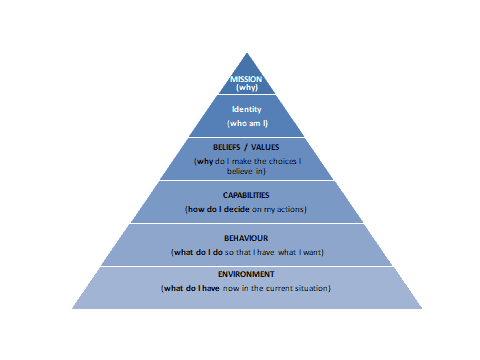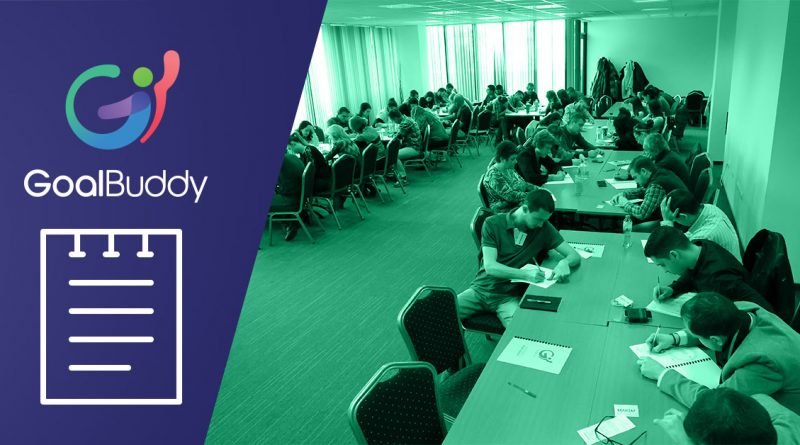The way our identity affects the achievement of goals
It was a fascinating presentation on the topic of NLP[1] by Georgi Nenov[2] that made us think hard about the connection between our success and what we are as individuals. It turned out the concept is as obvious as it is difficult to comprehend. So, we decided to take on this challenge.
Dilt’s Pyramid
Robert Dilts, one of the world-renowned experts in the field, offers this ingenious method for introspection. The Pyramid presents the logical levels that we should climb when we seek a positive development in any area of our life.
Here it is:

At the bottom is where we currently are while our real aspirations are high up at the top. All the steps in between are the transformations that we must undergo in order to ascend to the very peak.
Or as one of the principles of this analysis states, “An issue cannot be resolved at the same level at which it arose.”
The change that comes from the inside
The Dilts Pyramid illustrates that we have to advance by first analyzing the underlying nature of a given problem.
We have witnessed it over and over again how people failed regardless of their efforts. It was happening just because the problem was residing at a completely different level from what they were operating at.
It’s extremely hard to understand and even admit to yourself that what you want might simply be at great odds with our current state of being.
What is identity?
It is something like the computer operating system – a complete set of beliefs and values that makes it possible for us to function as a person.
Let’s say you are a smoker and you are convinced that cigarettes are not that harmful. You don’t think there is anything cancerogenic about them. This line of thinking, sooner or later, will become an integral part of you.
At the end that’s exactly what will make it so much harder for you to quit smoking. Deep-rooted falsehoods like this one are to be found at all levels when you start addressing the goal for a healthy lifestyle.
A full circle
Your personality has been formed over the years and is not easy to radically change overnight. No matter how well you formulate your intention and what system you employ one thing is for sure:
If the objective is directly going against the identity then all kinds of issues will come to the forefront.
It all could have been different!
In fact, your identity is where change must start. You will need the non-smoker’s point of view if you are ever to succeed in dropping the bad habit. In other words, you should aim at improving your attitude first.
It’s easier said than done, right! We know perfectly well that defeating the nicotine addiction is a tricky and long process. What we would like to emphasize here is the need to alter the way you see yourself.
There are a few more cases we would like to bring up:
Example # 1: “I don’t have the will power for this”
Let’s say you want to form some good habits and you know very well that it will require a lot of self-discipline.
But if you feel that you don’t have it in you then thoughts like “I am not a strong person” or “A structured life is so difficult” will only keep you down. Eventually, this low self-esteem becomes an instinctive reaction to any hard work.
How can you achieve success if any obstacle looks to you insurmountable? And that will stay true until you manage to undergo the necessary internal transformation.
Example # 2: “I’m the ‘lone wolf’ type of a person”
One of the most important and common tasks in life is to form a family.
But if you think of yourself as highly independent and self-sufficient how can you be motivated to look for a life-partner? Perhaps you think that true love is possible only in fairy tales or that a good relationship is more of an exception than a rule. Any of these ideas would clash with the idea of a personal relationship.
Example # 3: “I’m not rich”
You won’t be able to reach any financial independence if the above statement is deeply rooted in your consciousness!
It simply won’t work out, or at least not in the long run. The main reason is that this limiting belief is constantly fed with negatives such as “money is the root of all evil” or “I am so bad at saving money”.
As in any other aspect of our lives, nothing will happen if our attitude doesn’t undergo the needed re-focus and change.
The mechanism
There are two paths you can take:
- You don’t do anything because you understand it will be against your true nature;
- Or you can give it a try but you do it in such a way that you fail for sure. This is the case of subconscious self-sabotage. Of course, you can make a great effort and yet nothing would come out of it.
The truth is very simple:
Beliefs exert influence over our actions which, in turn, determine the outcome. In turn, this same outcome can change our set of mind and thus our behavior.
How to make most of this realization
At this point we hope the concept is crystal clear – in order to achieve a given objective, it must be first harmonized with us as a person. Therefore, we must start carefully working on it.
Next is to figure out how to do that. There are several approaches involving our “GoalBuddy” system. We know that very well since we have done exactly that.
The very first step
Of course, we can’t fully tackle an issue if we are not fully aware of its existence. And the most effective way to bring it to the forefront is our “GoalBuddy” system.
The fear and discomfort are a sure indication that there is something wrong and limiting in your attitude. Niki’s experience in this respect was quite indicative. He never felt at ease talking to a big audience. He realized it only when he and Ivan started their workshops and had to address a large number of people. Over the years, though, and with enough practice, he was able to overcome this “stage fright”.
The only way to get a healthy dosage of confidence is when your actions result in something quite the opposite of what your fears and insecurities were suggesting. There is no other way to reshape your old identity into a new and better one.
A cycle of self-reinforcing confidence
Well, it’s a process and it won’t happen overnight. That is why we use 90-day goals to gradually bring in progress towards our vision.
The idea is that with the help of these 90-day cycles we are overcoming our fears one step at the time. Little by little, we begin to register some small results and learn from our experience. Thus, over time, we become more and more confident to set our sight on bigger objectives. This process will eventually allow us to get rid of any limiting beliefs and will put us on the road towards a new identity. And we mean the same one that successful people enjoy.
A helpful hand
We cannot always fully realize the need for change. Here comes to our rescue the social element of our system, aka the Goal Buddy.
The most important factor is the objective feedback from a person who knows you well and is sincerely interested in your well-being. They would make it easier and faster for us to become aware of what parts of the belief system are holding our progress back.
A full set of tactics and strategies
We have no doubt that it can be very helpful for you to learn about various ways and approaches to resolving any problems in achieving your goals.
Once you know the true nature of your objectives you can fully embrace the desire for change. This will clear your road to success. Then you can use all the tactics and new skills available to you. Eventually, you can harness the power of intention, persistence and time accumulation to get where you want. And that fits perfectly with the new identity you created along the way.
[1] Neuro-linguistic Programming, NLP, which is a psychological approach to communication and personal development.
[2] The creator of the podcast “Being superhuman with Georgi Nenov”.

